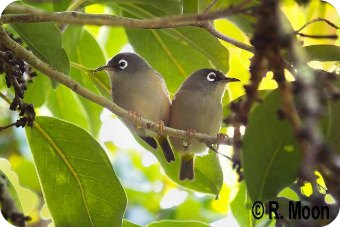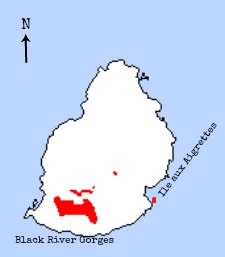Mauritius Olive White-eye
Zosterops chloronothos
Factsheet
A small endemic passerine, the Mauritius Olive White-eye is considered critically endangered following severe decline in its population size and distribution over the past few decades.
It is the smallest of the Mauritian songbirds and is the least known of all Mauritian birds. Unsurprisingly, it is difficult to trace its common name in the local Creole tongue.
Conservation efforts to help save the species from extinction were initiated in 2005 and a field team was stationed at Combo, in the uplands of Mauritius, to study the breeding and general behavior of these birds in their natural wild habitat.

Photo Courtesy: R. Moon
Common name:
English: Mauritius Olive White-eye
French: zostérops de Maurice or oiseau à lunettes
Mauritian Creole: lizye blan, zozo lizye blan (literally: white-eyed bird) or zozo pit pit
Species name author:
Louis Jean Pierre Vieillot, a French ornithologist (1817)
Taxonomy:
Order: Passeriformes
Family: Zosteropidae
Current IUCN Red List category:
Critically Endangered (CR)

International Union for the Conservation of Nature - Critically Endangered
Description:
The upperparts are a dull olive colouration whilst the underparts are paler
Eyes are surrounded by a conspicuous white ring
Size - about 10 cm
Average mass - 8 g
Population:
Size - 190-296 mature individuals
Trend - decreasing
Distribution size (breeding/resident): 61 sq km
Habitat:
High forest dependency
Mainly in the wettest upland tropical forests of Black River Gorges National Park, Macchabée and Bel Ombre
Diet:
Nectar of several endemic flowers, fruits and insects
Threats:
Nest predation by introduced mammals and birds ( Crab-eating macaque, Ship rats, native Mauritius Black Bulbul Hypsipetes olivaceus and Red-whiskered Bulbul Pycnonotus jocosus)
Habitat degradation and loss caused by the introduction of exotic plants
Destruction of nests, eggs and chicks by tropical cyclones
Conservation:
A species recovery programme was initiated by the Mauritian Wildlife Foundation in September 2005
Breeding behaviour is closely monitored
Wild population monitoring
Predator control at nest sites
Rescue/harvest of wild nests, artificial incubation and hand-rearing of offspring
A trial release of birds to the predator-free and restored Ile aux Aigrettes, located off the coast of south-east Mauritius, in December 2006
Distribution Map

Other Endangered Bird Species of Mauritius
■ Mauritius Kestrel ■ Pink Pigeon ■ Mauritius Fody, ■ Mauritius Echo Parakeet ■ Mascarene Paradise Flycatcher ■ Mauritius Black Bulbul ■ Mauritius Grey White Eye ■ Mauritius Cuckooshrike
Return from Mauritius Olive White-eye to Mauritius Holidays Discovery Home